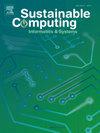DT-GWO: A hybrid decision tree and GWO-based algorithm for multi-objective task scheduling optimization in cloud computing
IF 5.7
3区 计算机科学
Q1 COMPUTER SCIENCE, HARDWARE & ARCHITECTURE
引用次数: 0
Abstract
Cloud computing faces significant challenges in task management, particularly in balancing server loads to prevent both overload and underload conditions while meeting diverse quality of service requirements. The need to manage multiple criteria further increases the complexity of this problem. Additionally, the heterogeneity of cloud resources often complicates efficient task scheduling. To overcome these challenges, this paper introduces a hybrid model that integrates the decision tree approach with the Grey Wolf Optimization (GWO) algorithm for the scheduling of independent tasks. The model aims to optimize makespan, reduce total cost, enhance resource utilization, and maintain load balance. In the proposed approach, tasks are first classified using a decision tree, after which the GWO algorithm allocates resources to the selected tasks. Simulations are conducted using the CloudSim toolkit, in a heterogeneous environment. The experiments consider various input scenarios, ranging from 200 to 3200 tasks. Compared to the standalone GWO algorithm, the proposed DT-GWO hybrid model achieves improvements of at least 18.5 % in makespan, 3.4 % in average resource utilization, and 12.7 % in total cost, all while maintaining load balance.
DT-GWO:一种基于混合决策树和gwo的云计算多目标任务调度优化算法
云计算在任务管理方面面临重大挑战,特别是在平衡服务器负载以防止过载和负载不足的情况下,同时满足不同的服务质量要求。管理多个标准的需要进一步增加了这个问题的复杂性。此外,云资源的异构性通常会使有效的任务调度变得复杂。为了克服这些挑战,本文引入了一种将决策树方法与灰狼优化(GWO)算法相结合的混合模型,用于独立任务的调度。该模型以优化makespan、降低总成本、提高资源利用率和保持负载平衡为目标。在该方法中,首先使用决策树对任务进行分类,然后GWO算法将资源分配给选定的任务。在异构环境中使用CloudSim工具包进行模拟。实验考虑了不同的输入场景,从200到3200个任务不等。与单独的GWO算法相比,本文提出的DT-GWO混合模型在保持负载平衡的情况下,完成时间至少提高18.5 %,平均资源利用率提高3.4 %,总成本提高12.7 %。
本文章由计算机程序翻译,如有差异,请以英文原文为准。
求助全文
约1分钟内获得全文
求助全文
来源期刊

Sustainable Computing-Informatics & Systems
COMPUTER SCIENCE, HARDWARE & ARCHITECTUREC-COMPUTER SCIENCE, INFORMATION SYSTEMS
CiteScore
10.70
自引率
4.40%
发文量
142
期刊介绍:
Sustainable computing is a rapidly expanding research area spanning the fields of computer science and engineering, electrical engineering as well as other engineering disciplines. The aim of Sustainable Computing: Informatics and Systems (SUSCOM) is to publish the myriad research findings related to energy-aware and thermal-aware management of computing resource. Equally important is a spectrum of related research issues such as applications of computing that can have ecological and societal impacts. SUSCOM publishes original and timely research papers and survey articles in current areas of power, energy, temperature, and environment related research areas of current importance to readers. SUSCOM has an editorial board comprising prominent researchers from around the world and selects competitively evaluated peer-reviewed papers.
 求助内容:
求助内容: 应助结果提醒方式:
应助结果提醒方式:


